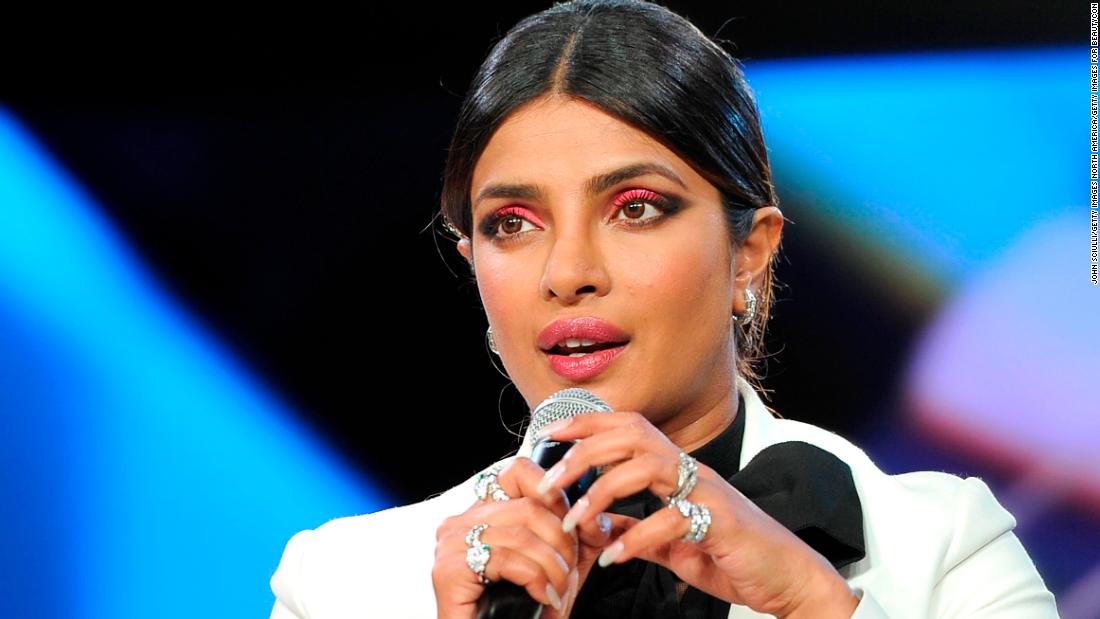Pakistan calls on UNICEF to drop actress Priyanka Chopra as an ambassador

In a letter addressed to UNICEF Executive Director Henrietta Fore and posted online Wednesday, Pakistan’s Human Rights Minister Shireen Mazari asked for the 37-year-old former Miss World to be “immediately denotified” from her role.Chopra was accused of “jingoism” and showing “support for war” by publicly endorsing the Indian government’s position on Kashmir, a disputed region that is claimed in full by both India and Pakistan.Earlier this month, Indian Prime Minister Narendra Modi’s Bharatiya Janata Party (BJP) announced it would strip autonomy from the state of Jammu and Kashmir — its part of the Himalayan region. India imposed curfews and an almost complete communications blackout. The move provoked a fierce reaction from Pakistan and demonstrations in support of Kashmir around the world.Mazari said the Indian government’s position on Indian-controlled Kashmir went “against the principles of peace and goodwill that Ms Chopra is supposed to uphold in her role.” Chopra is a goodwill ambassador for UNICEF, the United Nations children’s agency.”Her jingoism and support for violations by the Modi government of international conventions … undermines the credibility of the UN position to which she has been elevated,” Mazari said. “Unless she is removed immediately, the very idea of a UN Goodwill Ambassador for Peace becomes a mockery globally.” On Thursday, a spokesman for the United Nations Secretary-General Antonio Guterres said that goodwill ambassadors were only required to be impartial when they spoke on behalf of UNICEF.”When they speak in their personal capacity, they retain the right to speak about issues of interests or concern to them,” said spokesman Stephane Dujarric. “Their personal views, however, do not reflect those of the agency with which they may be affiliated with.”CNN has reached out to Chopra for comment. What Chopra saidMazra’s criticism of Chopra stems from comments she made earlier this month — and a tweet the actress posted in February. On February 26, when India and Pakistan, both nuclear powers, were teetering on the brink of war following the Indian bombing of a Pakistani village, Chopra tweeted “Jai Hind #IndianArmedForces,” which translates to “Hail India #IndianArmed Forces.”In August, after Modi stripped Indian-controlled Kashmir of its special status, a Pakistani woman at a beauty conference in Los Angeles confronted Chopra about her February tweet.”It was kind of hard hearing you talk about humanity, because as your neighbor, a Pakistani, I know you’re a bit of a hypocrite,” Ayesha Malik can be heard saying in a video of the confrontation that was posted on Twitter. “You are a UNICEF ambassador for peace and you’re encouraging nuclear war against Pakistan. There’s no winner in this.”Chopra’s initial response was: “Whenever you’re done venting … got it, done? Okay, cool.” The actress continued: “So, I have many, many friends from Pakistan and I am from India, and war is not something that I am really fond of, but I am patriotic. So, I’m sorry if I hurt sentiments to people who do love me and have loved me, but I think that all of us have a sort of middle ground that we all have to walk, just like you probably do as well.”Chopra — who invited Indian Prime Minister Modi to her wedding to singer Nick Jonas — has been criticized for being blindly patriotic and showing a lack of sympathy for suffering Kashmiris.She is not the only entertainer to support Modi and his BJP party. In Bollywood, filmmakers won over by what political scientist Kapil Komireddi terms the “cult of Modi,” have produced films that support the BJP agenda. On August 16, the United Nations Security Council discussed Kashmir, with the Chinese Ambassador Zhang Jun urging India and Pakistan to refrain from taking unilateral action which could aggravate what was already a “tense and dangerous” situation. According to a UN diplomat, council members failed to even come up with a statement to the press — the lowest level of council action. UN diplomats said countries disagreed on wording of a statement, with some fearing any comment would escalate tensions or would show bias towards Pakistan by simply holding the meeting.







